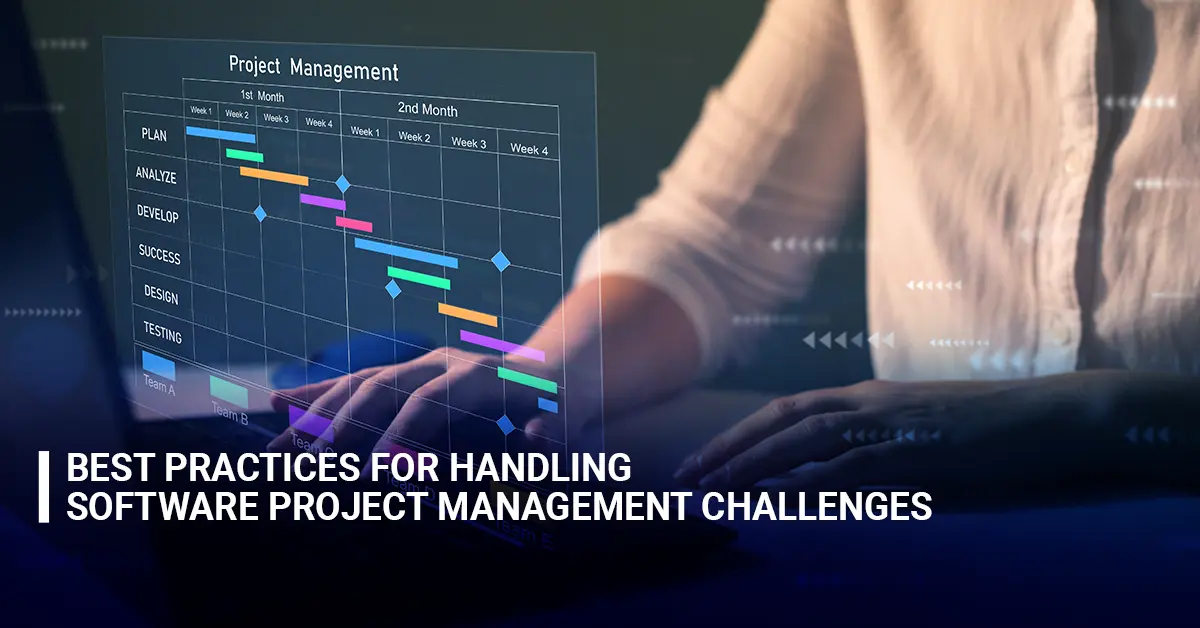Research
Share Knowledge
Brainstorm Ideas
Managing software projects can be complex and challenging due to various factors such as evolving requirements, technology advancements, and team dynamics. However, with the right strategies and practices, these challenges can be effectively managed. Here are some best practices to tackle common software project management challenges.
-
1. Clear Project Vision and Scope
Challenge:
Undefined or constantly changing project scope.
Solution:
Establish a clear and detailed project vision and scope at the outset. This includes defining objectives, deliverables, timelines, and success criteria. Regularly review and adjust the scope with stakeholder input to accommodate changes without compromising the project’s integrity.
Best Practices:
• Develop a comprehensive project charter.
• Use a scope statement to outline project boundaries.
• Implement a change management process to handle scope changes.
-
2. Effective Communication
Challenge:
Poor communication leading to misunderstandings and project delays.
Solution:
Foster an environment of open and transparent communication. Utilize collaboration tools and regular meetings to ensure all team members and stakeholders are aligned and informed.
Best Practices:
• Hold regular stand-up meetings and status updates.
• Use project management tools like Slack, Microsoft Teams, or Asana.
• Establish clear communication protocols and channels.
-
3. Realistic Planning and Scheduling
Challenge:
Unrealistic timelines and schedules leading to burnout and missed deadlines.
Solution:
Develop realistic project plans and schedules that consider potential risks and uncertainties. Break down tasks into manageable chunks and use estimation techniques to set achievable deadlines.
Best Practices:
• Apply Agile methodologies for iterative progress.
• Use Gantt charts and critical path methods for scheduling.
• Incorporate buffer times for unexpected delays.
-
4. Risk Management
Challenge:
Unanticipated risks derailing the project.
Solution:
Identify potential risks early in the project and develop mitigation strategies. Continuously monitor and manage risks throughout the project lifecycle.
Best Practices:
• Conduct regular risk assessments and create a risk register.
• Develop contingency plans for high-priority risks.
• Assign a risk owner to monitor and address risks proactively.
-
5. Resource Allocation
Challenge:
Inefficient use of resources leading to bottlenecks and productivity loss.
Solution:
Allocate resources based on project priorities and individual strengths. Regularly review resource allocation and adjust as needed to ensure optimal utilization.
Best Practices:
• Use resource management tools to track and allocate resources.
• Balance workload among team members to avoid burnout.
• Plan for resource contingencies to handle sudden changes.
-
6. Quality Assurance
Challenge:
Compromising quality due to tight schedules and budgets.
Solution:
Implement rigorous quality assurance (QA) practices throughout the development process. Conduct regular testing and reviews to ensure the software meets all quality standards.
Best Practices:
• Integrate QA into the development process with continuous integration/continuous deployment (CI/CD).
• Use automated testing tools to enhance testing efficiency.
• Conduct code reviews and peer assessments regularly.
-
7. Stakeholder Management
Challenge:
Misalignment with stakeholder expectations leading to dissatisfaction.
Solution:
Engage stakeholders early and often. Clearly communicate project goals, progress, and changes to manage expectations effectively.
Best Practices:
• Identify key stakeholders and understand their interests and influence.
• Hold regular stakeholder meetings to provide updates and gather feedback.
• Use stakeholder management plans to address their needs and concerns.
-
8. Adaptability to Change
Challenge:
Difficulty adapting to changing requirements and market conditions.
Solution:
Embrace flexibility and adaptability by adopting Agile methodologies. Focus on delivering value incrementally and be prepared to pivot when necessary.
Best Practices:
• Implement Agile practices like Scrum or Kanban.
• Encourage a culture of continuous improvement and learning.
• Use retrospectives to assess what’s working and what needs to change.
-
9. Budget Management
Challenge:
Overrunning project budgets.
Solution:
Develop a detailed budget plan and monitor expenses closely. Use cost estimation techniques and regularly review financial status against the budget.
Best Practices:
• Create a detailed budget with clear cost breakdowns.
• Use project management software to track and report expenses.
• Conduct regular budget reviews and adjust forecasts as needed.
-
10. Team Collaboration and Motivation
Challenge:
Low team morale and collaboration issues.
Solution:
Foster a positive and collaborative team environment. Recognize and reward contributions and provide opportunities for professional growth.
Best Practices:
• Promote team-building activities and open communication.
• Provide regular feedback and recognition.
• Invest in training and development for team members.
-
Conclusion
Successfully managing software projects requires a strategic approach to address various challenges. By implementing these best practices, project managers can navigate complexities, enhance team performance, and ensure successful project outcomes. Embrace flexibility, maintain clear communication, and prioritize quality to drive your software projects to success.
-
How can we help?
ITPN has leading-edge capabilities, top-class experts and pioneering experience in this area so please contact us if you have any questions or need assistance of our services.

